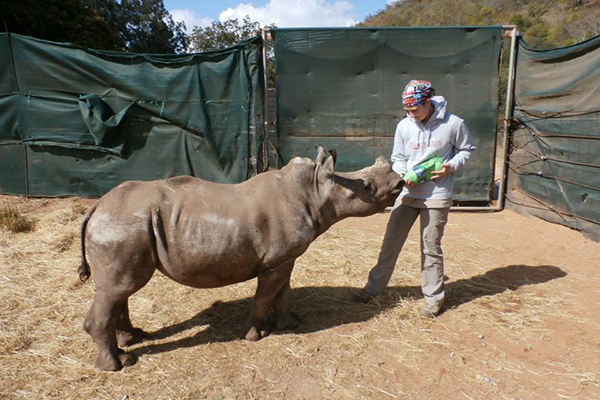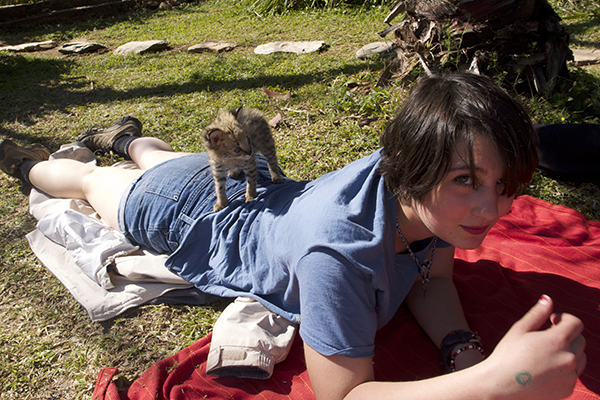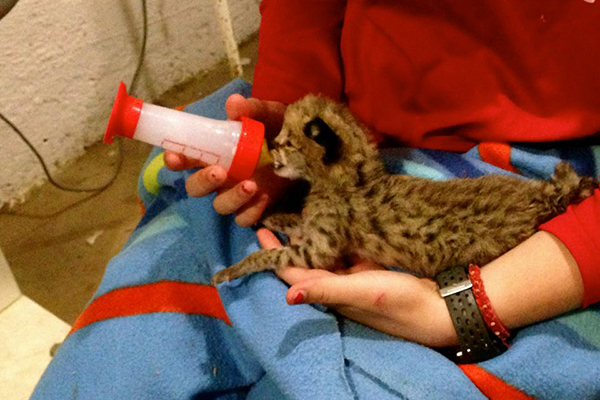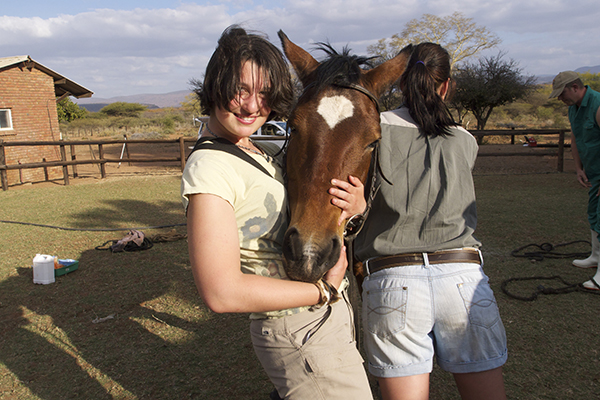Wildlife care
UD student gets hands-on experience in South African veterinary clinic
12:52 p.m., March 24, 2015--The first time University of Delaware student Sydney Bruck went to South Africa she was 17 and about to go off to the college, and while she knew she wanted to have a job working with animals, she had little experience and no idea what particular area she wanted to specialize in.
When she returned to South Africa this winter, after one and a half years studying pre-veterinary medicine and animal biosciences (PVAB) in the Department of Animal and Food Sciences at UD, she was not only certain about her career path but she was able to gain additional hands-on experience, applying the knowledge gained at UD to good use in the field.
Global Stories
Fulbright awards
Peace Corps plans
Bruck, who majors in PVAB and minors in wildlife conservation and biology, first traveled to South Africa through the African Conservation Experience (ACE) program. ACE placed her with two organizations, Khulula Care for Wild and the Shimongwe Wildlife Veterinary Experience, which set her up with a position at the Blouberg Animal Clinic.
With the Khulula program, Bruck was in the town of Nelspruit for a month taking care of wildlife in a rehabilitation center. She said it was a full-time responsibility that saw her doing tasks like waking up to feed kittens at 3 a.m. or warming baby rhinos who couldn’t regulate their body temperatures during the night.
“It was a completely selfless experience and it really helped me grow as a person,” said Bruck.
The experience was also one that took her completely away from the comforts of home, as the town was an hour away from civilization.
“We lived in the bush. There was barely any electricity, not much running water and you had to build a fire for a hot shower. I was 17 doing this and I flew over there by myself, didn’t know anyone there -- it was really to get myself out of my comfort zone and grow up, learn what I wanted to do,” Bruck said.
The program also allowed her to see parts of South Africa, including the Kruger National Park, and taught her a lot about leadership, as every week she had to pass on information to new recruits who came into the program. She was also exposed to exotic animals.
Perhaps most importantly, the service trip taught Bruck that she didn’t want to take care of animals around the clock for a living. “It didn’t really inspire me to become a veterinarian because it’s a lot of work taking care of animals every single day, and it wasn’t what I wanted to do.”
She discovered what she wanted to do during the second program, which was in a bigger town and dealt with companion animals as well as calls to farms.
“It was such a different experience,” said Bruck. “I actually had a proper bed, a real shower, so it was definitely different. We shadowed a wildlife vet and that’s what I really loved doing.”
Bruck said that she was given a lot of trust by the veterinarians at the clinic who gave her important tasks to complete, such as helping to administer blood, tuberculosis and pregnancy tests to 40 water buffalo and then giving them anti-parasite medicine during her first day on the job.
“It was completely out of my comfort zone but it was such a rush getting out into the field and dealing with antelopes, wildebeests and buffalo,” said Bruck.
At this program, Bruck also got to work with companion animals in the veterinary clinic and she established connections that allowed her to travel back to South Africa this past winter.
“The first time around, I wasn’t qualified to take any of those experiences and really learn and possibly apply those in the future if I become a vet because I had no background,” said Bruck. “So studying at UD and going through all the classes and being here for one and a half years and then going back was amazing because I actually had some background. During class, I could actually go back and realize, ‘Oh, this is what we were doing then.’”
This time around, Bruck spent two months in South Africa, working more with companion animals in a clinic, helping with surgeries and replacing and giving IV lines to puppies afflicted with parvovirus, which is a big issue in South Africa.
With regard to the surgeries, Bruck said that one of the veterinarians there commended her on her ability to jump in and help out but to also stay away when she wasn’t needed, which she said can be equally important in that setting.
Bruck would also go around on vaccination consultations, learning what to look for during routine checks and picking up some of the South African Afrikaans language.
All this work in the clinic helped Bruck realize exactly how she wants to help out animals in her future career.
“Once I got to the veterinary side, I realized that I don’t like taking care of animals. I like treating them. And I think that’s a huge distinction that I don’t think many people can see,” said Bruck. “I don’t want to walk the dog, or feed the dog, but if you come to me with a problem, I will give it my heart and try my best to fix it.”
Bruck also said that it is important for those who are thinking about a veterinary career to realize there are a lot of areas to the field and to find one that works best for them, which to her means treating companion animals. “You know it’s always a struggle between money and happiness but I think that in this case, happiness would probably have to stay with the companion animals.”
As for her continued visits to South Africa, Bruck said that she can “definitely picture when people are begging me to retire, I could see myself moving to South Africa to open a clinic there just to see if I can bring anything to the table. It definitely brought a lasting mark to my life. They gave me so much that I’ll bring with me forever so if I could give that back in any way, that would be fantastic.”
Article by Adam Thomas
Photos courtesy of Sydney Bruck














